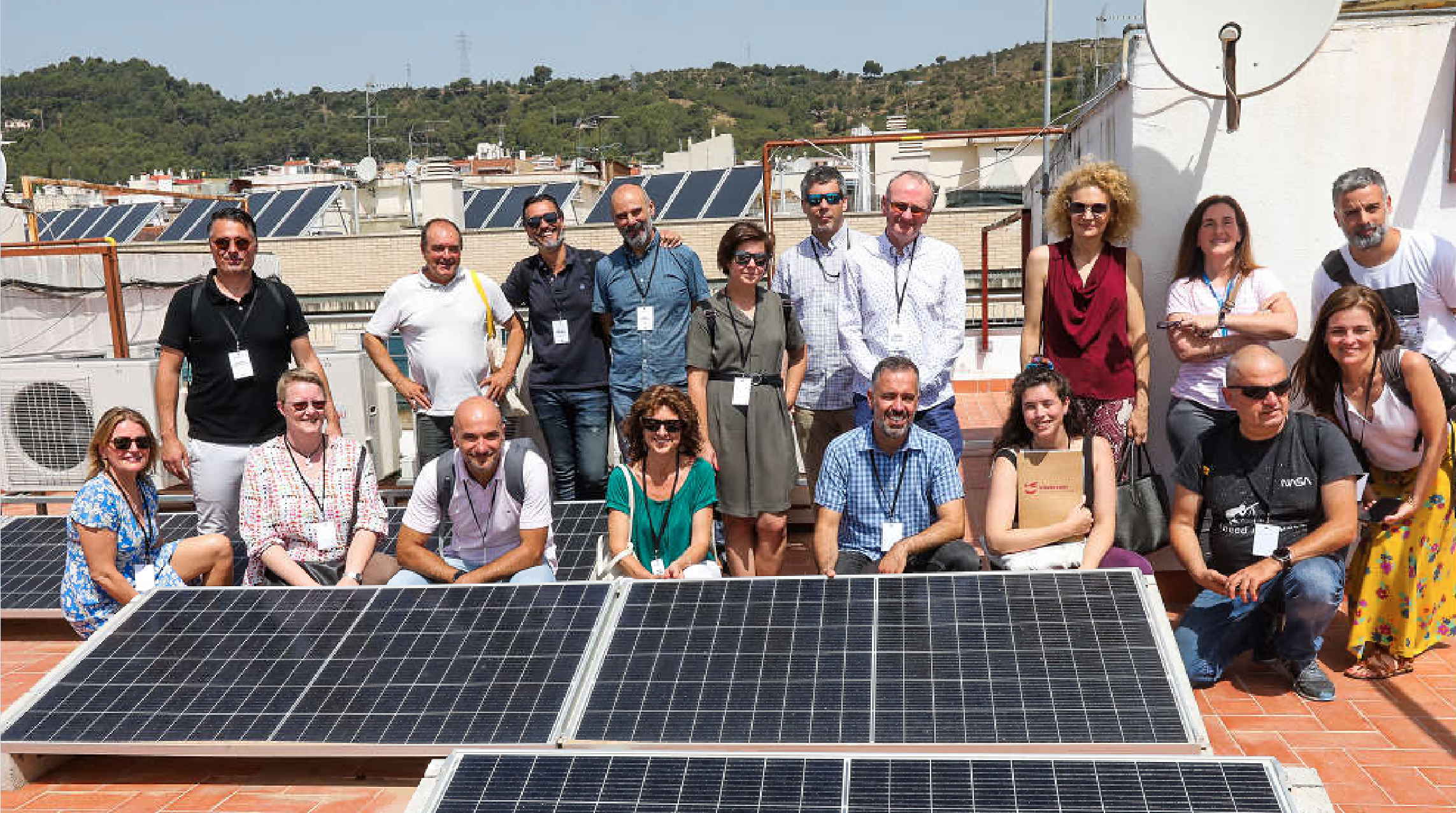
URBACT Expert Eddy Adams explores the green shift’s potential impacts on employment.
Temperatures are hitting record highs across Europe. In Western France, meteorologists talk about a ‘heat apocalypse’ as more than 25 000 people flee their homes to escape forest fires. Spain, Portugal and Italy have all been on an emergency footing with fires and recorded deaths due to heatstroke. Northern Europe has also experienced temperatures normally associated with the Middle East, and a recent German Environment Ministry report estimated that the financial impact of drought, floods and extreme heat in the country had been EUR 145bn since 2000.
The Climate Emergency is a real and present danger. To combat this, the EU has committed to be climate neutral by 2050 - a central objective of the European Green Deal. Cities are in the front line of this transition, being the biggest contributors to greenhouse gas emissions worldwide (more than 60% according to UN Habitat), consuming 78% of the world’s energy and being home to 65% of the EU’s population. Recognising this, the URBACT IV programme has Green Cities as one of its strategic priorities. But what will the transition to climate neutrality mean for jobs and skills as our economy makes this huge green shift in less than a generation?
What are green jobs?
The twin megatrends of green and digital will affect every industry sector, and every occupational skill level. The EU forecasts that a handful of carbon-intensive industries will disappear altogether by 2050. These include coal and lignite mining, together with their support services, as well as oil and gas extraction. The decline of these sectors is expected to remove 338 000 jobs, heavily clustered in specific regions. Although this pathway is now slightly less clear, as Member States stall on decommissioning these sectors in response to the energy crisis triggered by the war in Ukraine, the overarching European Green Deal policy goal of climate neutrality remains intact.
Four other industry sectors - chemical manufacturing, non-metallic-mineral manufacturing, basic metal manufacture, and the automotive sector - are expected to be totally transformed, as their use of energy and materials is revolutionised. However, every industry sector is likely to be affected by the shift that’s already taking place. A very narrow definition of the ‘Green Economy’ suggests a relatively modest workforce of 4.5 million workers in the EU. But EU data shows that low carbon sectors - the fastest growing in the economy - already employ more than 70% of workers. As the concept of circularity is embedded across key, high-energy industry sectors like construction, which currently accounts for one third of all EU energy related emissions and over 35% of waste, this trend will continue, as will the demand for properly skilled workers at all skill levels.
What does this mean for skills in the city?

As Ed Glaeser, Harvard Economics professor and expert on cities, consistently points out, skills are a valuable commodity for every city. Successful cities are those that nurture, retain and attract talent. Organisations need skilled people, while workers need to refresh their skills continually to remain in demand in a competitive job market. Linked to this, the pace of change - driven by digital innovation and the need to reduce carbon emissions - is accelerating. At the same time, the OECD estimates that the declining demand for lower level skills will continue, driven by automation and other digital developments. All of this means that frequent upskilling will be required for workers to VILAWATT URBACT Network during a site visit to Viladecans.
stay in touch with labour market developments.
That is potentially a growing problem for urban economies. For many, the profile is one of rising vacancies with residual pools of unemployment and economic inactivity. The recently refreshed EU Skills Agenda noted that 70 million EU adults lack basic numeracy, reading and digital skills. At the same time there is a wide - and potentially growing - skills gap as employers struggle to find staff with the right skillset.
However, recent research shows that higher skilled people are those most likely to participate in further training. Only one in five low skilled workers participates in upskilling, often through lack of funds, knowledge or time. So a major shift is required if we are to avoid a widening skills gap, with the risk of increased social polarisation.
Who’s most at risk of being left behind - and what are cities doing about it?
Just transition, a concept initially developed by trade unions in North America, means achieving climate neutrality without leaving any person or place behind. It is a central part of the European Green Deal. A recent report by Urban Innovative Actions (UIA), Skills for a Green Future, focused on the employment and skills dimension to the Just Transition, setting out the challenges cities face as well as the innovative approaches being developed in response. This identifies five specific groups at risk of being left behind as the economy transitions to climate neutrality:
- Vulnerable people already marginalised in the labour market
- The low-skilled
- Women, older people and youth
- Micro-businesses and the self-employed
- Workers in energy intensive and high-carbon emitting industries
At the recent URBACT City Festival 2022, Maarten van Kooij, Strategic Adviser to the City of Rotterdam, showed that Rotterdam (NL) workers already in precarious jobs and sectors face increasing risk as the economy transitions. The pandemic had exposed their situation, evidenced by the fact that 15 000 of the city's 43 000 self-employed workers required temporary income support during the crisis. With limited resources and minimal access to careers guidance and training, they remain poorly informed and ill-equipped for the shift that’s already happening. Rotterdam is designing new approaches to address this, including its innovative Work Learning Agreements.
Anamaria Vrabie, Director of the Urban Innovation Unit, echoed these points from the perspective of Cluj Napoca (RO). Although the city’s economy has been a big success story in the past decade, their work has identified significant risks due to high levels of automation, with implications for the lower-skilled in particular. Supported by its strong higher education offer, the growth of the creative and cultural industry sector has been part of the Cluj success story. However, the pandemic underlined the vulnerability of many workers in this sector, which is characterised by micro-businesses and the self-employed. The development of their so-called culturepreneur programme, designed to enhance the resilience of cultural and creative industries, has been a key innovation. Through its UIA project ‘Cluj Future of Work’, the city is also piloting innovative approaches to preparing one of Europe’s most vulnerable communities - the Roma - to improve their employability, through potential links to the circular economy.
Sonia Dominguez, Head of EU funds at Viladecans (ES) showed how supporting micro-businesses has also been a priority, after the city identified them as being at risk. Public procurement has been a key driver in changing mindsets here, as has the city’s establishment of spaces, both digital and physical, to promote cross-sectoral collaboration. This has been particularly effective at facilitating dialogue between businesses in ‘old’ and ‘new’ sectors.

As the UIA report notes, the energy transition will also have implications for gender balance in the workforce, creating more jobs traditionally associated with men according to the International Labour Organisation. For example, in the renewable energy sector, where the number of jobs is forecast to jump from 10.3 million in 2017 to almost 29 million in 2050, only 32% of the current workforce are women. In response, Viladecans has targeted interventions towards women to raise their awareness of the employment shift that is taking place, and the opportunities and threats it brings.
The link between the gender equality mission and the transition to climate neutrality is clear. So too is the need to combine the climate and social justice agendas effectively if cities are to achieve just transition, as Mathew Bach of ICLEI - Local Governments for Sustainability noted in the URBACT Festival session. This means informed investment and a drive to promote cross-departmental collaboration within administrations, as well as effective partnerships across the public, private and NGO sectors.
Where do we go from here?
The challenges ahead cannot be overstated. As the slogan says, “there is no planet B”, and cities must lead in implementing the transition to a climate neutral Europe. The front-runners are already showing the way, and initiatives like the EU’s Climate Neutral Cities Mission and Scalable Cities are setting the pace. But a mass movement is required to reach the goal of climate neutrality, with small and medium sized cities fully on board. Supporting all cities to make a successful transition requires everyone to raise their game.
A just, green transition also requires smart cooperation across traditional silos, informed by smart strategic investment. The URBACT IV programme, with its pillars of green, digital and gender-equal cities, anticipates these needs in cities, and will provide space for collaboration, peer-learning and capacity building. URBACT will also offer a platform to transfer experience and techniques in effective urban interventions, both through its own good practices and its ongoing cooperation with UIA and the future European Urban Initiative.
--


